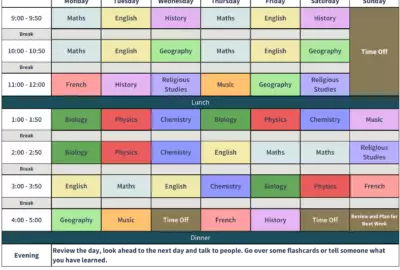Expert Insights
How to Revise for English Literature GCSE
Published 26th January 2024 by Alastair

There’s no sugar-coating that the English literature GCSE is going to require a lot of revision. You’re going to need to know these texts inside out and back-to-front.
Plus, you need to be able to compare with other texts and situate them within the wider genre and historical context. Therefore, its time to get out your biggest ring-binder, the brightest array of highlighters possible, and all the post-it notes under the sun. Before you begin, read through our top tips, collected from our Ivy expert tutors, and if the mountain still seems too big to climb alone, no problem. Speak to our client services team today who will be more than happy to find you an expert to guide you on your way to English Literature GCSE success.
The English Literature GCSE consists of two exam papers. Paper 1 includes a Shakespeare play and a 19th century text. Paper 1 is 1 hour and 45 minutes long. There will be questions relating to a selection of Shakespeare plays and texts – but the most important thing to remember is that the text shouldn’t be a surprise, students will need to read through the entire paper to find the questions relating to the text they studied in school. Don’t rush in and answer the first question you see! Don’t try to write about Macbeth if you studied Romeo and Juliet (there will always be one who makes this mistake)! Paper 2 includes questions relating to a modern text, a poetry anthology, AND an unseen poem. This paper is 2 hours and 15 minutes long. Again, only the unseen poem will be a surprise, the other texts will be familiar ones you have studied in school, so take your time at the beginning of the exam to find which questions you need to answer. Paper 2 is the longer exam (shown below as the new 'A' section), and worth more marks, keep this mind when revising but don’t let it encourage you to neglect Paper 1.
Notes:
Paper one is 1 hour 45 minutes, worth 40% of the overall grade
Paper two is 2 hours 15 minutes, worth 60% of the overall grade

If you’ve read all this and you’re feeling overwhelmed by the thought of revision, then first of all, know you are not alone. The texts chosen have been studied extensively and there is a wide range of resources available which means you’re not starting from scratch. Some of our favourites include:
Read on to discover our 10 top tips for mastering English lit revision, all recommended by our expert tutors.
Know the exam format and content so you know what to revise and when, this will ensure your revision is focused and efficient. Also prioritise revision so you cover your weakest areas first. We recommend starting with the text you find hardest first before moving onto a quick recap of your favourite texts and finally, revisiting those old weaknesses (cough cough Shakespeare) to ensure you are fresh on all content just before the exam.
Once you know what texts you need to revise and when the exams are, it’s time to create a timetable. Be realistic about how much time you can commit to each text without neglecting some self-care time. All the important things like sleeping, eating, exercise and keeping hydrated should be in your schedule! Revision should not come at the sacrifice of these things. Also, get creative with your self-care, include some activities with friends that allow you to share the ups and downs of this period. Remember, you’re not in this alone! Schedule time to go outside and exercise (even just a walk)! Consider individual and group study sessions. Separate practice question time from revision notes making time. Rewards are a great motivation!
Whether its flashcards, mindmaps, the Cornell method, or just a jumble of highlighting and post-it notes on your chewed up copy of the Tempest… make sure you have a system that works for you. These notes are going to be an accumulation of two years of work, so do yourself a favour and don’t leave them to the last minute.
Spaced repetition is the secret to remembering just about anything. This means take some time to read through your notes every few days. Use iPhone apps such as Memrise or Quizlet to test yourself on key quotes or themes. Using a variety of methods to revise, in small regular chunks will optimise your studying.
Maybe not cover to cover – but revisit key extracts and revise the sequence of events. Try explaining the plot of a text to a friend or family member who isn’t familiar with events, and see if they understand it. One of favourite revision techniques is to describe the drama of a story as if it was an episode of reality TV. Macbeth and the Kardashians have a lot more in common than one might first think…
Your friends are you’re a huge asset here. Swap practice questions and give eachother 3 WWW (what went well…) and 3 EBI (even better if…). Not only might you learn a new angle or way of considering events, you might pickup some snazzy new vocab to try out yourself. You can also ask your teachers and tutors for feedback on where you lost marks.
Practise papers are super important preparation for the real thing. Not only do they familiarise you with the format of the exam, but they are great for practising timings. A great advantage is you know which texts are going to come up (apart from the dreaded Unseen poem of course). Therefore, the more you familiarise yourself with the big themes and characters, the more prepared you are for any possible exam question.
Remember, you want to make it as easy as possible for the examiner to award you marks. Write in clear handwriting, with well defined structure, use good SPaG (spelling and grammar), and signpost your paragraphs.
Don’t spend all your time reading through the exam paper, but also don’t rush into answering the wrong question, or start writing something without planning. Strategise how long you have to spend on each question and break that up into reading time, planning time, writing time and checking time.
Your school teachers, friends and family are there to support you both academically and socially throughout the long haul of GCSE revision and exams. If you need some extra help, or just want to feel a little more confident in your preparation, then an Ivy Education expert tutor might be the answer for you.
2.1Begin by understanding the exam structure and identifying areas of weakness. Create an outline of what you need to cover and then prioritise based on your comfort level with each text.
Create a realistic timetable prioritising challenging texts and incorporating self-care.
Utilise resources such as Sparknotes and CGP English text guides so you don’t waste time making notes that have already been made for you.
Use a variety of note-taking methods and revisit your notes regularly. Focus on key extracts, themes, and characters so you don’t get overwhelmed by the whole text.
Practice spaced repetition and use mnemonic devices for effective memorisation. Quizlet is fantastic for this!
Hire an Ivy expert tutor! At the end of the day, there is nothing better than personalised feedback, and that’s exactly what we’re here for.
A combination of all 3 will ensure you score top marks – having a clear harness of all aspects of the texts will really allow you to make comparisons and critiques that will impress examiners!
Use them an supplementary resources not the basis of your study, but also don’t waste time copying out notes someone has already written. Work smarter not harder!
Practice regular analysis and utilize online tools like Quizlet for effective memorisation.
Find a balance between independent and group revision to gain varied perspectives and swap hints. Set aside time to do a timed practice question as a group and swap answers for feedback. Utilise your friends as your best resource!
Practice mindfulness, seek support from peers and professionals, and prioritise self-care.
Strategise time allocation for each question, including reading, planning, writing, and checking.
Regularly review your performance on practice papers and seek feedback from teachers or an Ivy expert tutor.
In summary, effective revision for English Literature GCSE involves understanding the exam structure, setting clear objectives, and utilising a well-organised revision plan. Don't hesitate to seek help from various resources, including our expert tutors. Encourage yourself throughout the journey and remember that success is achievable with dedication and strategic preparation. Ivy Education is here to support you on your path to English Literature GCSE success. Good luck!
Our expert GCSE and iGCSE Tutors can help you ace your GCSE revision. View our expert tutors and contact us today!
View GCSE Tutors















